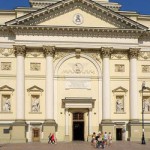Poland. Smolensk cross at Saint Anne’s.
12 Nov 2010 The Smolensk cross has been relocated this week from the Presidential Palace chapel to the nearby St Anne’s church. The move puts an end to a long controversial row. The Catholic Church had accused Poland’s politicians of politicizing the matter.
The Smolensk cross has been relocated this week from the Presidential Palace chapel to the nearby St Anne’s church. The move puts an end to a long controversial row. The Catholic Church had accused Poland’s politicians of politicizing the matter.
The cross was the centerpiece of a conflict between supporters of the Law and Justice party (PiS) on one side and President Komorowski, the government and secular politicians on the other over the place of religious symbols in public places. It was erected in April by the Scouts as a symbol of mourning after the death of President Lech Kaczynski, his wife, and 94 others onboard the plane crashed on landing at Smolensk Severny airport in Russia.
Later in summer, the cross was relocated from outside the Presidential Palace to the palace chapel, in a surprise move which angered protestors who wanted the cross to remain where it was. Following the attempt on 3 August to move it further to St. Anne’s church, just down the road, – when police clashed with protestors – it was decided the cross would be taken on a Pilgrimage leaving two days later to the holy shrine of Jasna Gora in the southern city of Czestochowa, also without success.
Groups of elderly Kaczynski supporters kept guard round the clock for several days to prevent its removal, accusing Komorowski, the Prime Minister Tusk and Civic Platform (PO) of betraying Poland and the Catholic faith. A hard-line group, the so-called “Defenders of the Cross“, opposed any decision unless a permanent memorial would have been installed. Some 77% of Poles surveyed by stats researcher GfK Polonia for Rzeczpospolita daily saw the cross relocation to the presidential chapel as the right decision.
According to a joint statement by the President’s Chancellery, Warsaw diocese, a scout organisation “the Academic Church of St Anne in Warsaw, a place strongly bound to the history of … Poland. This temple is the site of permanent prayers for the tragically perished President Lech Kaczynski, his wife and all victims of the Smolensk catastrophe.”
Comment Form
Welcome
We are a group of long experienced European journalists and intellectuals interested in international politics and culture. We would like to exchange our opinion on new Europe and Russia.
Categories
- Breaking News (11)
- CIS (129)
- Climate (2)
- Energy&Economy (115)
- EU Eastern Dimension (85)
- Euro 2012 – Sochi 2014 – World Cup 2018, Sport (43)
- Euro-Integration (135)
- History Culture (198)
- International Policy (261)
- Military (74)
- Interviews (18)
- Italy – Italia – Suisse (47)
- Odd Enough (10)
- Poland and Baltic States (126)
- Religion (31)
- Russia (421)
- Survey (4)
- Turning points (4)
- Ukraine (176)
- Российские страницы (113)
Archives
- November 2020
- October 2020
- September 2020
- August 2020
- July 2020
- May 2020
- April 2020
- March 2020
- January 2020
- December 2019
- November 2019
- October 2019
- September 2019
- August 2019
- July 2019
- June 2019
- May 2019
- April 2019
- March 2019
- February 2019
- December 2018
- November 2018
- October 2018
- September 2018
- August 2018
- July 2018
- June 2018
- May 2018
- April 2018
- March 2018
- February 2018
- January 2018
- December 2017
- November 2017
- October 2017
- September 2017
- August 2017
- July 2017
- May 2017
- March 2017
- January 2017
- December 2016
- November 2016
- October 2016
- September 2016
- July 2016
- June 2016
- May 2016
- April 2016
- February 2016
- January 2016
- November 2015
- October 2015
- September 2015
- June 2015
- April 2015
- March 2015
- February 2015
- January 2015
- December 2014
- November 2014
- October 2014
- September 2014
- August 2014
- July 2014
- June 2014
- May 2014
- April 2014
- March 2014
- February 2014
- January 2014
- December 2013
- November 2013
- October 2013
- September 2013
- August 2013
- July 2013
- June 2013
- May 2013
- April 2013
- March 2013
- February 2013
- January 2013
- December 2012
- November 2012
- October 2012
- September 2012
- August 2012
- July 2012
- June 2012
- May 2012
- April 2012
- March 2012
- February 2012
- January 2012
- December 2011
- November 2011
- October 2011
- September 2011
- August 2011
- July 2011
- June 2011
- May 2011
- April 2011
- March 2011
- February 2011
- January 2011
- December 2010
- November 2010
- October 2010
- September 2010
- August 2010
- July 2010
- June 2010
- May 2010
- April 2010
- March 2010
- February 2010
- January 2010
- December 2009
- November 2009
- October 2009
- September 2009
- August 2009
Our books




